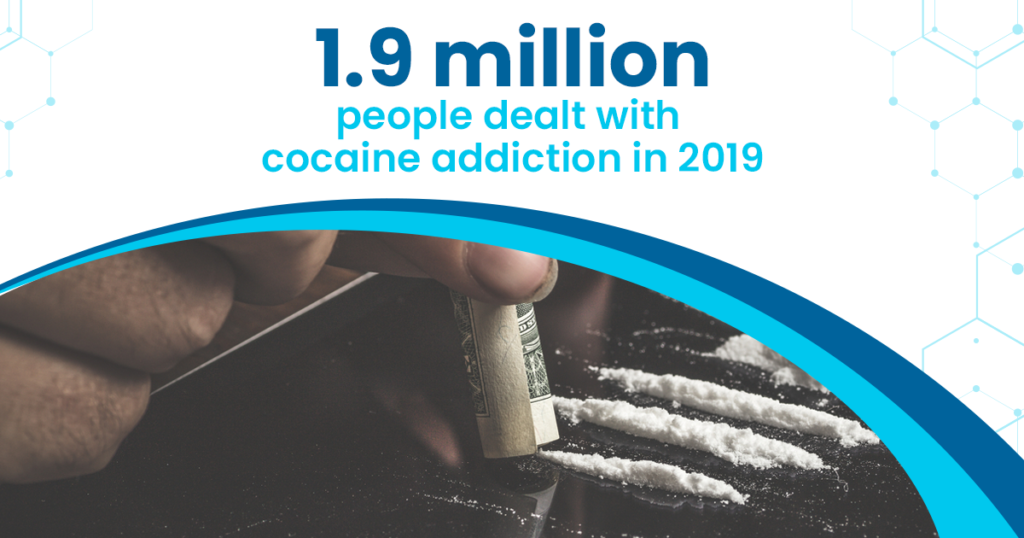
Cocaine is a hazardous substance that can quickly make you dependent, eventually resulting in cocaine addiction. The National Survey on Drug Use and Health in 2006 indicated that around 35.3 million Americans over 12 had used crack at some point in their lives.
The National Survey on Drug Use and Health (NSDUH) 2019 estimates that 1.9 million people used cocaine in 2019. Cocaine is one of the second most extensively used illegal drugs substance. Users report feeling incredibly alert and invigorated after taking it. When it’s in powder form, it can be snorted, injected, or smoked.
Crack is the name given to cocaine that has been “cooked” into a solid build and can be smoked or injected. There is minimal difference between the two in terms of chemical structure, and both are commonly mixed with additional medicines, including laxatives and fentanyl. Medical professionals can help you with a medical detox that helps to reverse the changes cocaine does to your brain.
Indications for Cocaine Detox and Withdrawal Symptoms
The first step toward recovery from cocaine dependence should always be a medically supervised detox program. Detoxing from cocaine at home is risky. This is the reason withdrawal symptoms should be addressed under medical supervision. Medical supervision ensures that if there is a medical emergency during cocaine withdrawal, aid is close at hand.
The use of cocaine alters the neurotransmitters of your mind, and when you try to quit, the withdrawal process begins. When a smooth detox for cocaine takes place in a controlled environment, the next step is psychotherapy and behavioral therapies.
Withdrawal symptoms from cocaine use can be evaluated and controlled by medical specialists around the clock. Here are some of the frequent indicators of cocaine withdrawal:
- Pain in the nerves
- Pain in muscles
- Uncontrolled needs for cocaine
- Trouble concentrating
- Fatigue
- Anxiety\Chills\Nightmares
- Depression
- Tremors
- Nightmares
How to Get Through Cocaine Withdrawal
Cocaine’s half-life in the human body is relatively short. However, once use is stopped, withdrawal symptoms emerge quickly. The severity of the symptoms depends on how frequently crack and cocaine are used. Detoxing under medical supervision can help your body be safely cleared of addictive substances.
Withdrawal in Three Stages
The first stage of cocaine withdrawal is known as “the crash,” It can last between a few hours to a few days. Negativity, exhaustion, impatience, and agitation permeate society at large. Some people may even start thinking about taking their own lives during this time.
The Second stage involves continued withdrawal; during this phase, a person’s mood improves as the dopamine levels normalize. However, a person may feel restlessness and problems with energy levels during these times. It almost takes a time duration of up to 10 weeks.
At this point, extinction usually takes up to six months. The urges of a user during this stage could be extreme and unexpected. In this case, the cocaine abuse symptoms can reduce within 18 hours.
The severe withdrawal symptoms often last for about a week to two weeks. However, the severity and duration of withdrawal symptoms will differ for each person. Those with a mild to the moderate history of cocaine use should start to feel relief from withdrawal symptoms within 18 hours. Chronic cocaine users often experience the worst withdrawal symptoms between the second and fourth days following their last use.
What Is Included in Cocaine Detox?
Detox assists with the physical elements of recovery, while treatment addresses addiction’s psychological and emotional roots. Depending on the individual’s needs, detox can take place in various settings, from a short-term detox-only clinic to a long-term rehab facility where they can start and finish treatment in the same place.
Detoxing at home is an option, but many people find that the structure and medical care offered at an inpatient detox clinic is the best way to ensure the safest detox and a healthy start to their recovery. Health care providers handle cocaine detox with care as it is drug abuse.
Why is Cocaine Detox Integral?
Before beginning treatment, the client must detox from cocaine or crack. Some people are admitted to a rehabilitation facility, while others can quit with their doctor’s guidance in a more private setting.
A medical facility has determined that inpatient detox provides the safest environment for the patient. Your entire symptoms can be monitored in real-time, facilitating rapid diagnosis and treatment.
Most cocaine detox centers aim to accomplish the following:
- The Avoidance of Relapse
- Possessing the capacity to serve as a foundation and support system
- Keeping an Eye on Withdrawal Signs
- Medical Intervention
Frequently Asked Questions
Can you detox from cocaine at home?
Cocaine detox is much easier than other detoxification for other drugs as it happens swiftly, albeit it can take a long time, depending on the duration of your addiction.
What are withdrawal symptoms from cocaine?
When it comes to taking cocaine can have plenty of problems, such as emotional consequences and cognition problems.
What are the withdrawals of cocaine?
The withdrawal involves a lack of concentration, depression, and nightmares as it gets you into a challenging situation. It is a social drug leading to many troubles.
Get Back To Everyday Life With Help From The Haven
Addiction can be challenging to overcome on your own. Fortunately, The Haven is ready to provide you with the care and support you need to get back to a healthy lifestyle.
The Haven has everything required to successfully recover from detox and therapy to our effective aftercare programs. Through our inpatient program, patients will have access to a safe environment for recovery, 24/7 medical care, and various recreational amenities.
When you are ready to take the first step, contact The Haven at (561) 328-8627.